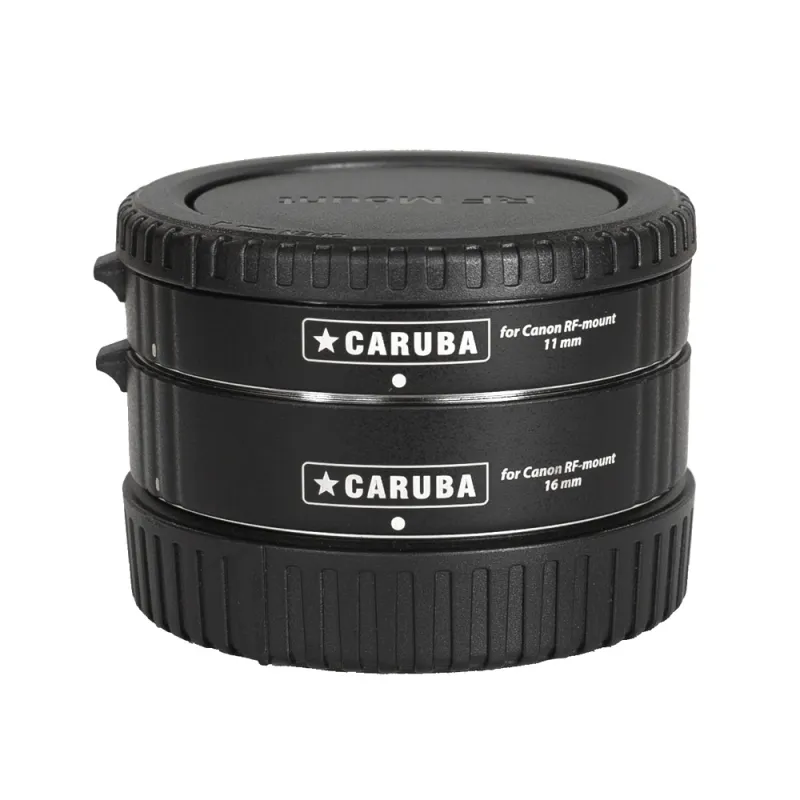Discover related products
Discover related products
Video
Info
Caruba Extension Tube set Canon Chroom (type II) RF-SERIE (for Canon RF-cameras)
The Caruba Extension Tube set for Canon RF consists of two extension tubes that can be used separately, but also combined. The extension tubes do not have any optical elements and therefore it is possible to photograph subjects larger and from a closer distance without changing the quality of the image. The extension tubes have a chrome base and are compatible with Canon RF lenses. Features such as auto focus and TTL light metering continue to work as usual. However, manual focusing is recommended, as focus is very tight.
The Caruba Extension Tube set for Canon RF consists of two extension tubes that can be used separately, but also combined. The extension tubes do not have any optical elements and therefore it is possible to photograph subjects larger and from a closer distance without changing the quality of the image. The extension tubes have a chrome base and are compatible with Canon RF lenses. Features such as auto focus and TTL light metering continue to work as usual. However, manual focusing is recommended, as focus is very tight.
Ideal for macro photography
Every lens has a minimum focusing distance. If you put an extension tube, or so called spacer ring, between the lens and the camera body, the minimum focusing distance becomes smaller. The greater the focal length of the extension tube, the closer you can get. This is perfect for macro photography or for creating special close-ups.
How does a spacer work?
A spacer ring increases the distance between the image sensor of the camera and the rear lens of the lens. This shortens the focusing distance of the lens, making it possible to focus closer on the subject. As a result, the subject is projected onto the sensor larger than it would be without a spacer ring. A spacer ring thus increases the magnification factor of a lens. This can be calculated using the following formula.
Maximum magnification with spacer ring = lens magnification factor + (mm spacer ring / focal length)
Examples
For example, you have an 85mm lens with a magnification factor of 0.13. With the 12mm ring the magnification of the lens becomes as follows:
maximum magnification with 12mm ring = 0.13 + (12 / 85) = 0.13 + 0.14 = 0.22
With the 20mm spacer ring, the magnification factor of the lens becomes as follows:
Maximum magnification with 20mm ring = 0.13 + (20 / 85) = 0.13 + 0.24 = 0.37
With the 36mm spacer ring, the magnification ratio of the lens is as follows:
maximum magnification with 36mm ring = 0.13 + (36 / 85) = 0.13 + 0.42 = 0.55
You can also combine the spacer rings, with all three the magnification factor of the lens becomes as follows:
maximum magnification with 68mm ring = 0.13 + (68 / 85) = 0.13 + 0.80 = 0.93
Please note that when using all 3 stacked spacer rings there is a loss of light of approximately 2 stops!
Characteristics
- Set of two extension tubes
- Perfect for macro photography and close-ups
- Get closer to your subject and capture it larger
- Reduce the minimum focus distance of your lens
- Autofocus and TTL light metering work
- No change in the quality of your images
- Compatible with Canon RF lenses
- Chrome mount
- Warranty 3 years
In the box
- 1 x Extension tube 11mm
- 1 x Extension tube 16mm
- 1 x Lens cap

Artificial Intelligence assistant
This is the beta version of our new assistant chat, capable of answering both standard and advanced questions about product and store operations.
Or ask about:
What are the features? Is this in stock?
 Google
Google










